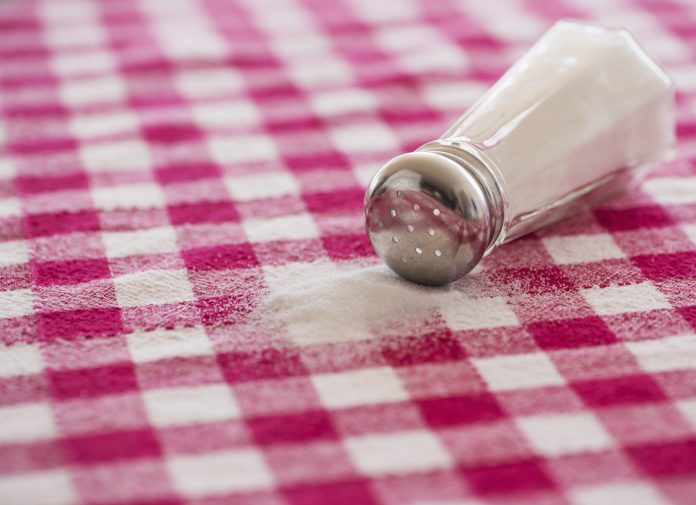The results of studies in mice and in humans suggest that a high-salt diet (HSD) may weaken some parts of the immune system. A research team headed by scientists at the University Hospital Bonn, found that mice fed a high-salt diet suffered from more severe bacterial infections than control animals. Their trial in human volunteers also showed that blood neutrophils taken from participants who ate an extra six grams of salt per day—that’s about the same as in two fast-food meals—were less effective at fighting bacteria. The results of the team’s studies are published in Science Translational Medicine, in a paper titled, “A high-salt diet compromises antibacterial neutrophil responses through hormonal perturbation.”
The commonly high salt content of Western diets poses a number of health risks, and is thought to contribute to so-called “prosperity illnesses,” the researchers wrote. We know, for example, that eating too much salt can raise blood pressure and so increase the risk of heart attack and stroke. The recommended daily salt intake is nevertheless “controversial,” the scientists continued, with the World Health Organization recommending a maximum amount of five grams per day—about a level teaspoonful. However, in Germany, this amount is likely to be exceeded, and figures from the Robert Koch Institute have suggested that men consume ten grams of salt daily, on average, while women may consume more than eight grams per day
As well as impacting on blood pressure and cardiovascular risk, an HSD is thought to be proinflammatory and to stimulate immunity, especially in the skin—which is the sodium storage organ of the body. For example, research has shown that some skin parasite infections in laboratory animals heal significantly faster if the animals consume a high-salt diet. And macrophages, which are immune cells that attack, eat, and digest parasites, are particularly active in the presence of salt. Some scientists have concluded that sodium chloride has a generally immune-enhancing effect, although as the University Hospital Bonn authors noted, “It is unclear whether an HSD can stimulate other immune cells.”
For their newly reported studies in mice, the team first investigated whether high dietary salt consumption could strengthen the immune system’s defenses against a serious urinary tract infection (UTI), pyelonephritis, caused by uropathogenic Escherichia coli (UPEC). Surprisingly, their results found that the kidneys of HSD-fed mice contained 4–6 times higher levels of UPEC bacteria than the kidneys of animals fed a normal-salt diet (NSD), or low-salt diet (LSD), which indicated a worsening of infection. Further investigation indicated that intrarenal neutrophils (one of a number of immune system cell types known as granulocytes) had less bactericidal activity during HSD exposure. “Thus, an HSD aggravated experimental pyelonephritis by compromising the bactericidal functions of neutrophils,” the scientists noted.

“We have now been able to prove for the first time that excessive salt intake also significantly weakens an important arm of the immune system,” added Christian Kurts, PhD, from the Institute of Experimental Immunology at the University of Bonn. There are two reasons for apparent contradiction. The first relates to the body’s need to keep the salt concentration in the blood and in the various organs largely constant. The only major exception to this is the skin, which functions as a salt reservoir of the body, and is why additional intake of sodium chloride works so well for some skin diseases.
However, other parts of the body are not exposed to the additional salt consumed with food. Instead, this salt is filtered out by the kidneys and excreted in the urine. And this is where the second mechanism comes into play. The kidneys have a sodium chloride sensor that activates the salt excretion function. As an undesirable side effect, however, this sensor also causes so-called glucocorticoids to accumulate in the body. And these, in turn, inhibit the function of granulocytes, which are the most common type of immune cell in the blood.
As the authors explained, “Unexpectedly, pyelonephritis was aggravated in mice on an HSD by two mechanisms. First, on an HSD, sodium must be excreted; therefore, the kidney used urea instead to build the osmotic gradient. However, in contrast to sodium, urea suppressed the antibacterial functionality of neutrophils, the principal immune effectors against pyelonephritis. Second, the body excretes sodium by lowering mineralocorticoid production via suppressing aldosterone synthase. This caused an accumulation of aldosterone precursors with glucocorticoid functionality, which abolished the diurnal adrenocorticotropic hormone–driven glucocorticoid rhythm and compromised neutrophil development and antibacterial functionality systemically.”
The team’s studies in volunteers indicated that sodium chloride may also have a negative effect on the human immune system. “We examined volunteers who consumed six grams of salt in addition to their daily intake,” said Kurts. “This is roughly the amount contained in two fast-food meals, i.e., two burgers and two portions of French fries.” The scientists then took blood from their subjects after one week on their HSD, and examined the granulocytes. They found, again, that the neutrophils showed impaired antibacterial function.
In human volunteers, the excessive salt intake also resulted in increased glucocorticoid levels. That this inhibits the immune system is not surprising. The best-known glucocorticoid, cortisone, is traditionally used to suppress inflammation. “Only through investigations in an entire organism were we able to uncover the complex control circuits that lead from salt intake to this immunodeficiency,” stressed Kurts. “Our work therefore also illustrates the limitations of experiments purely with cell cultures.”
As the authors concluded, “Our present study revealed that an HSD is not only proinflammatory but also has distinct systemic immunosuppressive effects that compromise the antibacterial immune defense … we have demonstrated that an HSD does not strengthen neutrophil responses but entails hormonal and metabolic alterations that systemically compromise their antibacterial activity.”
The team noted that their findings don’t demonstrate any association between a high-salt diet and an increased incidence of bacterial infections. Nor did they suggest that low salt intake was beneficial, “presumably because it cannot reduce glucocorticoid abundance below that was maintained by the ACTH regulatory hormone circuit. “Therefore, clinical studies in patients with UTI are needed to test clinical implications of our experimental observations,” they commented. “… our findings in mice and humans indicate that the Western diet is not exclusively proinflammatory because its high salt content has selective immunosuppressive consequences as well. This may be relevant for the current discussion about the recommended daily sodium intake.”



